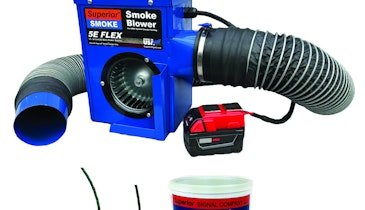Interested in Business?
Get Business articles, news and videos right in your inbox! Sign up now.
Business + Get Alerts“Save for a rainy day!” How many of us heard that advice as kids when we got that first bank account or perhaps learned elementary financial management in school? Now that we’re adults, we may appreciate the advice even more – and even better, follow it.
It’s advice that’s just as important for a business as for an individual or a household. And for a small business entrepreneur, it can be especially hard to follow – as financial advisor Alan Moore knows well.
“We tend to be risk takers,” says Moore, who operates Serenity Financial Consulting LLC with offices in Milwaukee, Wis. “Many of us had to put absolutely everything we own into a single pot to start the business.” As the business grows and revenues build, there’s a temptation to use it to buy new equipment, expand the business, or even just invest it in something with a high yield. “As a risk taker it can be so hard to just see cash sitting in an account and not doing anything.”
But however difficult it may be, putting away cash is critical to the long-term survival of your business. No matter how well you’re doing now, a business downturn is inevitable. Whether you survive can depend on how substantial your rainy day fund turns out to be. That will be when you find out for yourself what Moore says: “The cash reserve is the single most important investment that a business can make.”
HOW MUCH?
For an individual or household, the standard rainy-day-fund advice is to save three to six months’ salary to tide you over to cover bills and expenses if you lose your job. For business, that might be a starting point, but the principles are more complex. “It’s more about, what will it take to survive?” Moore points out. Ask yourself:
How steady is your monthly cash flow? Does it go up and down sharply, perhaps because of seasonal factors that influence the demands for your business? Or are you pulling in roughly the same amount of revenue each month? The more volatile your cash flow, the larger reserves you are likely to need.
What is the nature of your expenses, and are there easy ways to cut back if money gets tight? Are your personal reserves strong enough that you don’t need to keep paying your own salary? Will you try to find a new complementary line of business for which you’ll need to spend money marketing and buying equipment?
How large and diverse is your client base? “The larger and more diverse the income streams and client base, the less risk you have potentially in bad times,” Moore says. If a large part of your income comes from one client that suddenly closes or switches to a competitor, your revenues and profits will take a big hit.
The same is true if you have several clients, but they’re all in a niche vulnerable to common disaster. Imagine the plight of a septic pumper in a resort region who has all the contracts to pump out systems for area campgrounds – and then a massive forest fire closes the camps for months until they can make repairs.
If you have a wide variety of customers and no single one represents a big chunk of your business, you may be able to get by with smaller reserves.
And what about your supplier base? If you count on one equipment or consumables supplier who suddenly goes out of business, your company might suffer, too, until you find a new vendor, or even if you just have to pay a higher price to buy from someone else.
Where do you get it? The answer will be different for everyone. If you collect deposits from customers before starting work, Moore suggests funneling that check straight to your rainy day fund. That might not be possible for everyone. Many small contractors put deposits to work buying materials for the job itself. And some might not collect a deposit at all.
In that case, Moore advises putting a fixed percentage of each dollar in revenue – 5 or 10 percent, say – into your reserve fund.
Perhaps a sudden windfall, or at least part of it, could be diverted to your rainy day fund as well.
How do you keep it? An effective rainy day fund has three critical features: It’s liquid – easy to get at without fees or penalties. It’s safe – not at risk of losing value because of market fluctuations. And it’s out of sight.
For liquidity, nothing beats a savings or checking account. You don’t even want to put it in CDs, although they earn a little more, because if you have to cash out early, the penalty will wipe out your return.
Shop around for the best interest rate you can find, using a service such as bankrate.com to help you make comparisons. A money market bank account may give you a higher rate of interest. Use that, but only if you can be sure you won’t have to suddenly go below the minimum balance, which not only stops paying interest but may start incurring fees.
Moore understands the temptation to put at least some reserves into a higher-yielding investment, such as a mutual fund, even one balanced between stocks and bonds. His advice: Don’t do it!
“Your reserves are insurance against bad markets,” he notes. And what happens in bad markets? Investments often go down. Suddenly that reserve fund you’ve put into an investment portfolio so you can get a 3 percent return instead of the 1 percent the bank offers is down 10 percent, 20 percent or more – wiping out whatever you might have gained and more.
As for “out of sight,” at the very least the reserves should be in a completely different savings account from the accounts you routinely use to pay bills and receive revenue. But Moore often suggests clients go a step further, and put the reserve in a completely different bank.
Although you want it liquid, “you don’t want it super-accessible,” he explains. “If you stare at it every day when you log in to look at your checking account, you’re going to see that money just sitting there and it will bother you.”
PEACE OF MIND
When the worst happens and business suddenly goes south, it’s critical to be thinking about what really matters. And that shouldn’t be how you’re going to get through the month. “You need to focus on correcting the underlying issue, not paying your bills,” Moore says. “If your main focus is how to make payments, you’re going to be focused on the wrong thing.”
Suddenly, when a new customer calls, you’ll feel desperate to make a sale. Perhaps you’ll ignore red flags that would tell you to turn the business down. Or you’ll undercut yourself in your bid just to get the business. But if you have healthy reserves when you need to crack open that piggy bank, you can take a deep breath and really think long-term. And that will be the best way to bring your business back.





